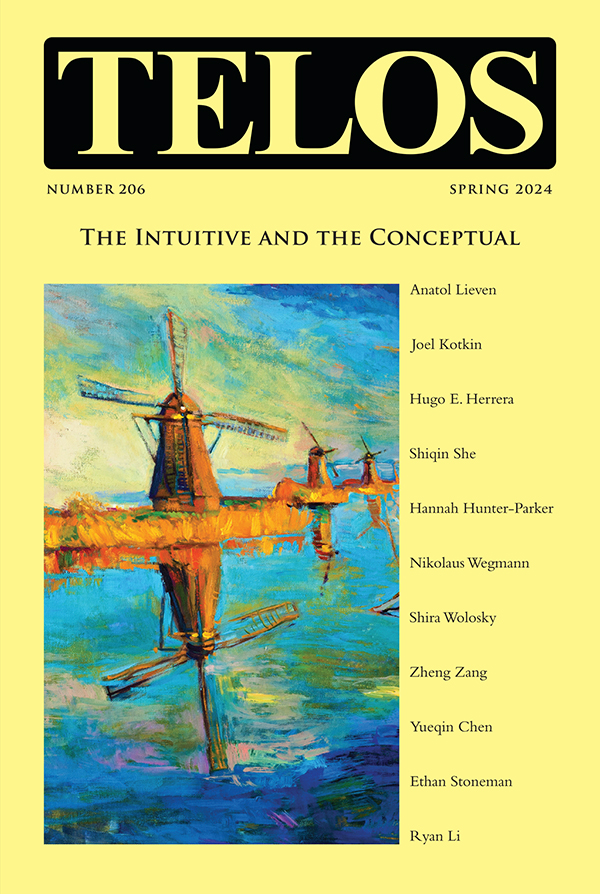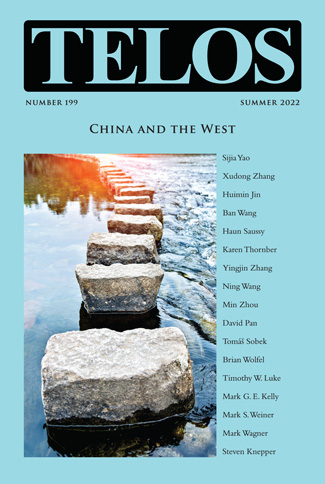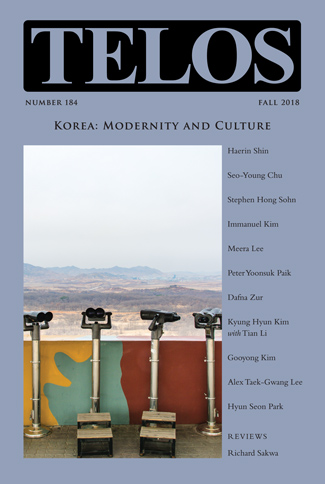By David Pan · Friday, April 5, 2024 Telos 206 (Spring 2024): The Intuitive and the Conceptual is now available for purchase in our store. Individual subscriptions to Telos are also available in both print and online formats.
 We often have the experience of intuiting something without being able to precisely define what that intuition is. Sometimes this intuition leads to a more well-defined insight, and sometimes it might lead to some kind of action, even in the absence of clear conceptual definitions. Yet it is difficult to ascertain what kind of knowledge or awareness such intuitions consist of. What is an intuition as opposed to a defined concept of something? How seriously should we take such intuitions? Are they something separate and qualitatively different than concepts? Are they just fuzzy concepts? Do they really exist at all? These are crucial questions because they lead to conclusions about the status of concepts themselves. If the alternative to clear concepts is nothing at all, then the sociopolitical corollary would be that the alternative to conceptual knowledge and the holders of such knowledge would also be nothing at all. By contrast, if intuitions are separate from concepts and real, then expert knowledge might possibly have some deficiencies in comparison with intuitions. The essays in this issue of Telos explore in one way or another this question of the status of conceptual knowledge as opposed to intuitive awareness. We often have the experience of intuiting something without being able to precisely define what that intuition is. Sometimes this intuition leads to a more well-defined insight, and sometimes it might lead to some kind of action, even in the absence of clear conceptual definitions. Yet it is difficult to ascertain what kind of knowledge or awareness such intuitions consist of. What is an intuition as opposed to a defined concept of something? How seriously should we take such intuitions? Are they something separate and qualitatively different than concepts? Are they just fuzzy concepts? Do they really exist at all? These are crucial questions because they lead to conclusions about the status of concepts themselves. If the alternative to clear concepts is nothing at all, then the sociopolitical corollary would be that the alternative to conceptual knowledge and the holders of such knowledge would also be nothing at all. By contrast, if intuitions are separate from concepts and real, then expert knowledge might possibly have some deficiencies in comparison with intuitions. The essays in this issue of Telos explore in one way or another this question of the status of conceptual knowledge as opposed to intuitive awareness.
Continue reading →
By Telos Press · Monday, September 26, 2022 In today’s episode of the Telos Press Podcast, David Pan talks with Xudong Zhang about his article “China and the West: Methodologies for Comparison,” from Telos 199 (Summer 2022). An excerpt of the article appears here. In their conversation they discuss how the specific comparison between China and the West leads to new methodologies of comparison; how a thematic mode of comparison works to bring China and the West in relation to each other; how the need for both a closed horizon, indicating a kind of self-isolation, and a common humanity relate to one another; how comparison can be framed within a context of both movement and action; and how comparison links the particular to the universal. If your university has an online subscription to Telos, you can read the full article at the Telos Online website. For non-subscribers, learn how your university can begin a subscription to Telos at our library recommendation page. Print copies of Telos 199 are available for purchase in our online store.
Continue reading →
By David Pan · Monday, June 20, 2022 Telos 199 (Summer 2022): China and the West is now available for purchase in our store. Individual subscriptions to Telos are also available in both print and online formats.
 The comparison of China and the West is in the first place a cultural problem to the extent that it requires a knowledge of both traditions and the ways in which they have related to each other. There has been a long history of interaction that has shaped the global economy from the times of the silk routes to the early modern push to find an alternative trade route to China in the European age of discovery and conquest. But the cultural comparison between China and the West today is inevitably overshadowed by a political dynamic in which the opposition reveals a rivalry that no longer exists, for instance, between Japan and the West. Indeed, the “West” in the opposition between China and the West could even be interpreted to include Japan or Taiwan. While the political opposition between China and the West may be reduced to the difference between authoritarianism and liberal democracy, this political dichotomy leads to cultural differences that result from the incompatibility between the two public spheres. While different public spheres will always manifest inconsistencies in terms of the problems and concerns that structure discussion and debate, China’s contemporary restrictions on free expression have separated it from the rest of the world in a more fundamental way by establishing an alternative version of historical facts. China’s alternative reality is not a consequence of its grounding in its distinctive cultural tradition but of the political decisions that have cut it off from the rest of the world. The attempt to compare China and the West must therefore take into account this politically enforced disjuncture. The comparison of China and the West is in the first place a cultural problem to the extent that it requires a knowledge of both traditions and the ways in which they have related to each other. There has been a long history of interaction that has shaped the global economy from the times of the silk routes to the early modern push to find an alternative trade route to China in the European age of discovery and conquest. But the cultural comparison between China and the West today is inevitably overshadowed by a political dynamic in which the opposition reveals a rivalry that no longer exists, for instance, between Japan and the West. Indeed, the “West” in the opposition between China and the West could even be interpreted to include Japan or Taiwan. While the political opposition between China and the West may be reduced to the difference between authoritarianism and liberal democracy, this political dichotomy leads to cultural differences that result from the incompatibility between the two public spheres. While different public spheres will always manifest inconsistencies in terms of the problems and concerns that structure discussion and debate, China’s contemporary restrictions on free expression have separated it from the rest of the world in a more fundamental way by establishing an alternative version of historical facts. China’s alternative reality is not a consequence of its grounding in its distinctive cultural tradition but of the political decisions that have cut it off from the rest of the world. The attempt to compare China and the West must therefore take into account this politically enforced disjuncture.
It would be a mistake, though, to see China and the West as polar opposites or competing civilizations, separated by their opposing political interests on the one hand and by the history of each of their cultural traditions on the other hand. Even if they had separate long histories, the recent past has seen many more opportunities for interaction and orientation around common projects and problems. Moreover, since the past is always a projection from out of the present, the idea of a clash of civilizations is not a legacy but a project. An alternative endeavor would be to conceive of the relationship between China and the West as existing within a larger totality. The definition of such a totality must occur within a particular perspective, however, and therein lies the problem. China and the West are clearly competing to define the framework of global order. Consequently, any attempt to consider the relationship between the two must look to the vision of universality that each side is trying to establish against the other. This issue of Telos considers a variety of ways of defining the overarching perspective from which the comparison between China and the West makes sense.
Continue reading →
By B. Venkat Mani · Monday, March 15, 2021 To read more in depth from Telos, subscribe to the journal here.
On January 31, 1920, Dr. Bhimrao “Babasaheb” Ambedkar—lawyer, thought leader, social thinker, and one of Columbia University’s most famous alumni, who later became the prime architect of the constitution of the postcolonial Republic of India—published the first issue of the Dalit newspaper Mooknayak (The Silent or Muted Hero). The aim was to create, in the Marathi language, an alternative narrative of self-representation of Dalits (then called “untouchables”) to counter the caste-biased local vernacular and colonial English-language newspapers in pre-independence India. Under Dr. Ambedkar’s leadership, and often led by his editorials, Mooknayak quickly turned into a megaphone for those who were consciously being silenced by those in power, a platform to champion the rights and dignity of the oppressed and impoverished lowest castes. The idea was effective: through Mooknayak, those who were marginalized and minoritized were able to leave a paper trail of their accounts, their struggles for dignity, hope, and rights for the next generations to come.
On December 18, 2020, at the end of a year marred by the global COVID-19 pandemic, during which a shadow pandemic exposed the socio-economic divisions and the differences between the mainstream and the marginalized across the world, the most befitting centennial tribute to the spirit of Babasaheb’s Mooknayak came through the publication of Trolley Times, a self-published newspaper of the Indian farmers’ movement. The paper drew its title from the trolleys (trailers) hitched to a tractor or a truck that have become the temporary abodes of thousands of farmers protesting at the borders of New Delhi since November 2020. The genesis of this newspaper is as extraordinary as its founding team, comprising a freelance journalist, a filmmaker, a documentary photo artist, and a physical therapist and farmer. Launched bilingually in Punjabi and Hindi with a first printing of 2,000 copies that quickly grew to 10,000 in the subsequent editions, Trolley Times established itself as a very important space for the narrative self-representation of the political and cultural spirit that is the driving force of the ongoing Indian farmers’ movement. With the digital presence of this newspaper on Facebook, Twitter, and Instagram, and more recently through online English translations of its issues, it is hardly surprising that Bloomberg called it the “fastest growing newspaper in India today.”
Continue reading →
By Haerin Shin · Monday, September 24, 2018 Telos 184 (Fall 2018), a special issue on Korea, edited by Haerin Shin, is now available for purchase in our store.
 While Korea’s history as a modern nation-state has always been a tumultuous reel of socio-political unrest, never has it drawn the globe’s attention to the degree and extent to which the press coverage of the past two years attests. South Korea’s candlelight demonstrations in the fall of 2016 were widely regarded as a newly arisen form of celebratory civil protest culture, and news of the progressive party’s subsequent rise to power stood out amid the global turn toward conservative politics. Meanwhile, with North Korea’s nuclear threat becoming a palpable reality, media outlets began clamoring with predictions of a major military outbreak across the Pacific. (I remember being inundated by concerned emails from acquaintances abroad during my breaks in South Korea last year.) Then came the dramatic shift toward prospects of denuclearization and North–South collaboration this past summer. Millions watched in awe as Kim Jong Un took President Moon’s hand and walked over the Military Demarcation Line. The meeting in Singapore was viewed with skepticism in the United States, but more pertinently such attempts to reestablish channels of communication were greeted warmly in South Korea. While Korea’s history as a modern nation-state has always been a tumultuous reel of socio-political unrest, never has it drawn the globe’s attention to the degree and extent to which the press coverage of the past two years attests. South Korea’s candlelight demonstrations in the fall of 2016 were widely regarded as a newly arisen form of celebratory civil protest culture, and news of the progressive party’s subsequent rise to power stood out amid the global turn toward conservative politics. Meanwhile, with North Korea’s nuclear threat becoming a palpable reality, media outlets began clamoring with predictions of a major military outbreak across the Pacific. (I remember being inundated by concerned emails from acquaintances abroad during my breaks in South Korea last year.) Then came the dramatic shift toward prospects of denuclearization and North–South collaboration this past summer. Millions watched in awe as Kim Jong Un took President Moon’s hand and walked over the Military Demarcation Line. The meeting in Singapore was viewed with skepticism in the United States, but more pertinently such attempts to reestablish channels of communication were greeted warmly in South Korea.
Continue reading →
By Peter C. Herman · Friday, May 11, 2018 In the April 12, 2018, issue of Art Journal, the editor, Rebecca Brown, introduces a work of art (really, a computer program), called CitationBomb by Zach Kailer, intended to create a kind of “denial of service” attack on Google Scholar: “The more users do this, the more Google Scholar will become overflowed with citations. This will make it difficult for the algorithms to make sense of influence or impact.” The overall point is to “devalue scholarly metrics” as they represent in small the horrors of the neoliberal university. As Brown puts it, “what numerical value applies to achieving the arc of a compelling paragraph? [It makes] manifest the un-usefulness of analytics . . . its profound, destructive force.”
Why are “analytics” so destructive? Kaiser explains that Google Scholar incentives “clickbait scholarship.” Meaning, since Google Scholar puts first the books or articles that get the most citations, this leads to a “winner take all” situation with scholarship. Only the articles that are cited often get cited at all, leaving all the other scholars in the dust.
Continue reading →
|
|
 We often have the experience of intuiting something without being able to precisely define what that intuition is. Sometimes this intuition leads to a more well-defined insight, and sometimes it might lead to some kind of action, even in the absence of clear conceptual definitions. Yet it is difficult to ascertain what kind of knowledge or awareness such intuitions consist of. What is an intuition as opposed to a defined concept of something? How seriously should we take such intuitions? Are they something separate and qualitatively different than concepts? Are they just fuzzy concepts? Do they really exist at all? These are crucial questions because they lead to conclusions about the status of concepts themselves. If the alternative to clear concepts is nothing at all, then the sociopolitical corollary would be that the alternative to conceptual knowledge and the holders of such knowledge would also be nothing at all. By contrast, if intuitions are separate from concepts and real, then expert knowledge might possibly have some deficiencies in comparison with intuitions. The essays in this issue of Telos explore in one way or another this question of the status of conceptual knowledge as opposed to intuitive awareness.
We often have the experience of intuiting something without being able to precisely define what that intuition is. Sometimes this intuition leads to a more well-defined insight, and sometimes it might lead to some kind of action, even in the absence of clear conceptual definitions. Yet it is difficult to ascertain what kind of knowledge or awareness such intuitions consist of. What is an intuition as opposed to a defined concept of something? How seriously should we take such intuitions? Are they something separate and qualitatively different than concepts? Are they just fuzzy concepts? Do they really exist at all? These are crucial questions because they lead to conclusions about the status of concepts themselves. If the alternative to clear concepts is nothing at all, then the sociopolitical corollary would be that the alternative to conceptual knowledge and the holders of such knowledge would also be nothing at all. By contrast, if intuitions are separate from concepts and real, then expert knowledge might possibly have some deficiencies in comparison with intuitions. The essays in this issue of Telos explore in one way or another this question of the status of conceptual knowledge as opposed to intuitive awareness. 








